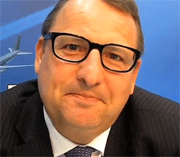Catching
Up With Chep

 The
last time we visited, it was still Unitpool. We caught Dr. Ludwig
Bertsch (right) in March 2012, before he rushed off to catch a flight
to the Middle East. When we asked him about current priorities, the
answers come out without hesitation – the integration of its
far flung business, especially the Driessen Services component in
Seattle, which specializes in ULD repair and maintenance, and rolling
out the former JMI Aerospace ACTIS IT system to manage the 50 repair
stations CHEP features worldwide, 23 of which are owned. The
last time we visited, it was still Unitpool. We caught Dr. Ludwig
Bertsch (right) in March 2012, before he rushed off to catch a flight
to the Middle East. When we asked him about current priorities, the
answers come out without hesitation – the integration of its
far flung business, especially the Driessen Services component in
Seattle, which specializes in ULD repair and maintenance, and rolling
out the former JMI Aerospace ACTIS IT system to manage the 50 repair
stations CHEP features worldwide, 23 of which are owned.
 We
continued the discussion with David Harman, (right) whose present
title is Director – Sales, Marketing & Account Management
and who has been managing Unitpool in Zurich since 2007. There are
additional projects ongoing, such as the total rewrite of the Tracker
IT system by Ultra to replace the former Videcom version. Testing
has been scheduled for January 2013. ACTIS will be used for accounting
functions, including Form 1, while the previous Tracker repair module
is being replaced by ACTIS. Two new repair stations have been added
to the network, Copenhagen, following the acquisition of the SAS account
and the last Nordisk Service Center and Atlanta. Talking about Atlanta,
CHEP Aerospace Solutions will participate and exhibit at this year’s
International Air Cargo Forum in October. We
continued the discussion with David Harman, (right) whose present
title is Director – Sales, Marketing & Account Management
and who has been managing Unitpool in Zurich since 2007. There are
additional projects ongoing, such as the total rewrite of the Tracker
IT system by Ultra to replace the former Videcom version. Testing
has been scheduled for January 2013. ACTIS will be used for accounting
functions, including Form 1, while the previous Tracker repair module
is being replaced by ACTIS. Two new repair stations have been added
to the network, Copenhagen, following the acquisition of the SAS account
and the last Nordisk Service Center and Atlanta. Talking about Atlanta,
CHEP Aerospace Solutions will participate and exhibit at this year’s
International Air Cargo Forum in October.
CHEP supplies all its owned and contracted
repair stations with handheld scanning equipment to record either
a ULD bar-coded identification or to enter the ULD serial number.
The units can also be used to order parts and as certification for
the repair release forms. When it comes to technology, tracking ULDs
has long been a very desirable feature; however, until recently no
single automatic identification method used has fully lived up to
the promise and the expectations. David confirmed that CHEP is aware
and looking at a number of options with the advent of GPRS solutions,
which have started making inroads in a number of airline applications.
ULD systems have long used industry standards messages and while GPRS
alternatives can fulfill the all-important requirement for location
identification, David firmly believes a message such as UCM will continue
to be used in order to provide flight movement information.
A frequent challenge has been the fact
that ULD pooling and management companies have contractual agreements
with carriers; carriers have handling agreements with ground handlers
who physically load, unload, store, and inventory ULDs on behalf of
the airline, yet the pooling companies depend on the ground handlers
for how carefully the ULDs are handled and to timely and accurately
report ULD activity to both airlines and pooling companies, with whom
there is no direct contract. There is a very direct financial impact
that affects airlines and pooling companies as a result of damage
to the units during ground handling. David indicates that there is
growing awareness about handling challenges on all sides and education
needs to continue.
And what about the business prospects?
According to Mr. Harman, only 12 percent of the global ULD inventory
is managed by polling companies, currently CHEP and Jettainer, therefore
there is significant potential to expand market share and attract
more airlines to pooling, and CHEP is committed to taking up the challenge.
There are customer airlines, such as the newly resigned UA/CO account,
through the Driessen acquisition, which contract only for ULD maintenance
and repair services, but no pooling or management. Air Cargo Germany
is becoming a new client for CHEP and David clearly sees the need
for CHEP to sign up a major passenger network carrier to finally break
the ice into the majors. Reference customers have worked well so far
when talking to new prospects, indicating that customers are satisfied
with the services they receive, as also evidenced by recent discussions
at the IATA WCS in Kuala Lumpur. Asked about the WCS, David said there
was some improvement in the overall format, with less choice in the
various tracks and the layout, yet he sees a benefit in being an IATA
registered supplier, which gets CHEP access to the delegates’
lists earlier, helping with scheduling meetings.
David went on to say that CHEP was on
track for growth, pulling together the headquarter in Zurich, its
operations center in Bangkok, adding the Seattle-based former Driessen
repair operation and the former JMI Aerospace services, and the IT
solution and customer base in New Zealand and Pacific Asia. The corporate
parent, the Australian Brambles, has been instrumental in contributing
know-how and experience to CHEP Aerospace, be it in the form of lean
6 Sigma or providing the resource to head up the 75-employee Bangkok
center. A new website is planned to come online in July.
With Jettainer the only competitor,
Davis believes the two companies have different business models and
he thinks CHEP offers more neutrality. Jettainer brands the ULDs it
manages for a customer carrier, whether it is Lufthansa Cargo or Swiss,
for example, whereas CHEP uses its entire inventory as a common pool.
During his address at the 2011 ULDUG
meeting in Miami, Michael Steen said ULD was an important and underestimated
topic and he would make sure they have a platform at the 2012 TIACA
event in Atlanta—but it remains to be seen.
Ted Braun
|



